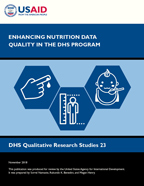
Abstract:
The DHS Program is a leading source of
nutrition data globally. Producing high-
quality data is core to The DHS Program’s
mission. Throughout the survey process, there
are many measures in place that ensure data
quality, and continual quality improvement
measurers are regularly reviewed and refined.
This report describes the factors that
facilitate or hinder nutrition data quality
during the survey process and provides
recommendations to ensure that The DHS
Program continues to provide high-quality
data for its users.
The nutrition topics of interest in this
investigation were anthropometry, hemoglobin,
and Infant and Young Child Feeding (IYCF)
practices because these topics present
challenges in data collection. A total of 54
key informants were interviewed (21 who were
internal to The DHS Program and 33 who were
external) and two focus groups were conducted
with 13 staff members from The DHS Program.
Participants emphasized the unique
considerations for nutrition data quality
within The DHS Program. The collection of
anthropometry and anemia data requires
quality measures that are distinctly
different from interviewing. Participants
also identified IYCF as one of the more
difficult topics to collect within the
questionnaire because capturing dietary data
is inherently challenging and also requires
context-specific adaptation of the
questionnaire.
A high level of capacity exists within The
DHS Program. Although they identified
important challenges, the informants felt
that collecting quality data was achievable.
The informants spoke with confidence about
realistic precision in large-scale surveys,
and they identified specific steps needed to
improve data quality. Informants who were
external to the DHS surveys cited DHS’s
reputation and the infrastructure built and
maintained by DHS over many years, which has
collected difficult-to-obtain data that
informs public health planning at the global,
national, and local levels.
A total of 32 recommendations emerged from
the key informant interviews and focus
groups. Under each recommendation are steps
to be considered by The DHS Program for
enhancing the quality of anthropometry,
hemoglobin, and IYCF data. Informants noted
the critical role of country ownership of
surveys and the importance of buy-in from the
host country to adopt data-quality measures
for nutrition.
Collecting high-quality data in some cases
will require new changes to The DHS Program’s
existing procedures, and in other cases it is
a matter of selecting data-quality activities
that have worked well in some surveys and
making them standard practice. In addition,
different strategies to increase data quality
are recommended, although not all strategies
have been tested for use in the DHS surveys,
thus pilots will be needed prior to wide-
scale adoption. It is important to recognize
that because each recommendation in this
report has budget implications, the
recommendations must be prioritized.
The DHS Program is the largest and most
enduring survey program of its kind and has
contributed to our understanding of
population, health, and nutrition in low- and
middle-income countries. Strengthening the
quality of nutrition data in The DHS Program
will, in turn, improve decision-making for
child nutrition and growth. Such an endeavor
will require careful evaluation of the
recommendations, adequate funding, piloting
of strategies, and continued monitoring over
several years to achieve the desired results.
